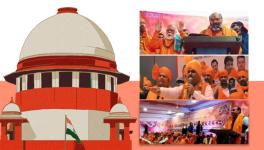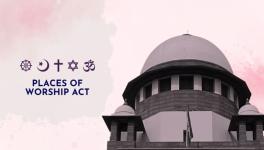Teachers Unhappy With SC’s Decision on Reservation in Appointments
The Supreme Court of India on Tuesday dismissed the Union Government’s special leave petition (SLP) filed against the Allahabad High Court’s 2017 decision to treat departments and not the university as a unit for according reservations in teaching position. However, the Democratic Teachers’ Front (DTF) has condemned the Supreme Court’s decision, and has demanded that the government introduce an ordinance to ensure that reservation is made on the basis of taking the university as a whole.
Accusing the government of not pursuing the matter seriously, the DTF’s press release stated, “The Government had filed the SLP half-heartedly only after the DUTA and many other organisations protested against the UGC notification dated 5 March 2018 that directed universities to switch to department/ subject-wise roster.”
Highlighting the impact of taking the department as a unit for reservation, the DTF stated: “For over 4,000 teachers working in the University of Delhi for long years in ad hoc capacity, whose appointment is renewed every 4 months, a change in reservation roster would change the nature of
each post. This would lead to reserved posts becoming unreserved, unreserved posts becoming
reserved, and also different reserved posts changing categories: a chaotic scenario with mass
dislocation and loss of jobs.”
Also Read | SCs and STs Biggest Losers in University Recruitment since March
The issue began with a challenge to the University Grants Commission’s (UGC’s) guidelines of August 25, 2006, wherein the university would be taken as a unit. A petition was filed challenging the order which led to the Allahabad High Court’s decision on April 7, 2017. The High Court’s reasoning was that taking the department as a unit would secure the presence of reserved categories in all departments, which may not be the case if the university is taken as a unit.
The UGC’s guidelines were framed on the basis of a 1997 office memorandum in the Department of Personnel and Training. The memorandum recognised that there may be situations where a particular department has only one vacancy. In such circumstances, reserving the post would amount to 100 percent reservation which goes against the 1992 Indra Sahwney Judgement of the Supreme Court where reservation was capped at an upper limit of 50 per cent. On the other hand, leaving such posts open to all would defeat any attempt at affirmative action. In this regard, it was recommended that all such vacant posts should be clubbed together and reservation be applied accordingly.
Also Read | SC Faculty Positions in BHU to be Cut By 50 Percent After UGC Notification
On March 3, 2018, the UGC issued an order doing away with the 2006 guidelines in conformity with the Allahabad High Court’s decision. Due to the pressure from various quarters, the Union Government filed an SLP in the Supreme Court against the Allahabad High Court’s decision. The Ministry of Human Resource Development issued directions to the UGC following which, on July 9, 2018, UGC issued a communication to all the universities, colleges and educational institutions to place the March order on hold for the duration of the SLP.
PS Krishnan, a retired administrative services officer, who had also served as a secretary in Ministry of Welfare, highlighted two instances where the negative impact of the UGC’s March 2018 order could be seen. In his correspondence with the prime minister, he mentioned that Indira Gandhi Tribal University had issued an advertisement for filling 52 posts. According to him, if the entire university had been taken as a unit, it would mean that 20 posts would be reserved. However, under the new guidelines, only one post was reserved, and not for a Scheduled Tribe (ST) candidate.
The other instance pertained to Banaras Hindu University (BHU). In this case, out of 1930 vacant posts, if the entire university is taken as a unit, reservation for Scheduled Castes (SC), STs and Other Backward Classes (OBC) would amount to around 14.97, 7.41 and 16.06 percent respectively. However, when departments are taken as units, then the reserved posts would fall to 6.17, 1.5 and 11.4 percent for SCs, STs and OBCs respectively.
Get the latest reports & analysis with people's perspective on Protests, movements & deep analytical videos, discussions of the current affairs in your Telegram app. Subscribe to NewsClick's Telegram channel & get Real-Time updates on stories, as they get published on our website.
























